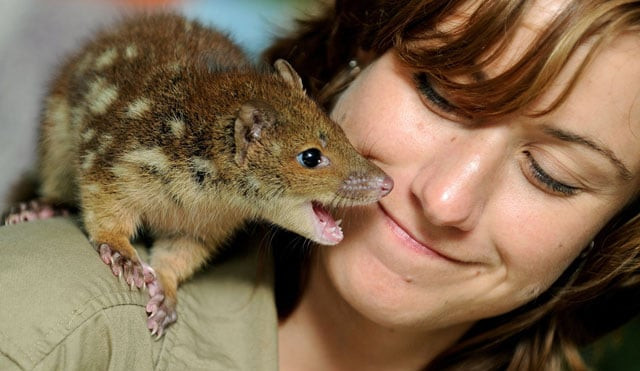Australian furry friend gets 'toad-smart' to survive
Toads were introduced to Australia in 1935 but are so poisonous they can kill predators that try to eat them

This file photo taken on November 3, 2011 shows mammals keeper Kylie Hackshall gets close to a baby spotted-tail quoll at WILD LIFE Sydney. PHOTO: AFP
Carnivorous quolls, commonly known as the native cat, are under attack from the poisonous cane toad, an invasive species from Central and South America.
The toads were introduced to Australia in 1935 but are so poisonous they can kill predators that try to eat them.
Numbering more than 200 million, the invasive species continue to spread across northern Australia at an estimated 40-60 kilometres (25-37 miles) a year, leaving a trail of catastrophic population declines in native predators.
Now a government-funded project has been set up to train "toad-smart" quolls to avoid eating the poisonous toads and help re-establish a population of the marsupials in Kakadu. Quolls are also under threat from feral cats.
Up to 30 trained quolls will be released in southern Kakadu's Mary River District this year as part of a three-year plan.
A successful experimental programme showed that the toad-smart females not only survived and reproduced but that new generations learnt to avoid eating the toads, resulting in a five-fold increase in local quoll numbers.
"It is fantastic to see the success of this innovative programme to protect Australia's small mammals," said Environment Minister Greg Hunt on Thursday.
"This is extremely important work. Without focused conservation initiatives such as this it would be unlikely the species would recover for the foreseeable future."
Threatened Species Commissioner Gregory Andrews said the project was part of a Aus$750,000 (US$585,000) investment strategy to make Kakadu safe again for native animals and plants.
"Quolls are an iconic carnivorous Australian marsupial and an incredibly important part of our ecosystem," he said. "By teaching the quolls not to eat cane toads and making Kakadu safe for them from feral cats, we can ensure their survival in this important world heritage-listed area."
National Parks director Sally Barnes said the research had shown that each generation of quolls would learn to avoid cane toads. "We are thinking this will only need to be done once to protect quoll populations from cane toads as each generation learns to avoid them," she said.
"The Kakadu research shows us that 'toad-smart' quolls can be reintroduced after a cane toad invasion."



















COMMENTS
Comments are moderated and generally will be posted if they are on-topic and not abusive.
For more information, please see our Comments FAQ